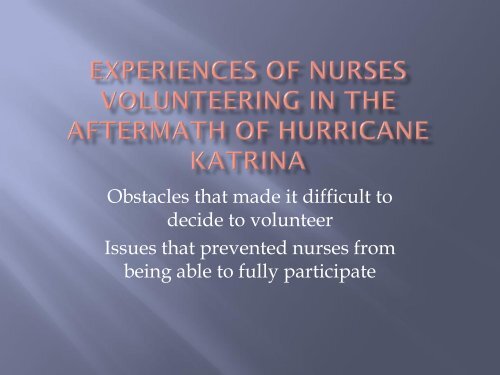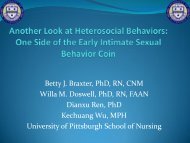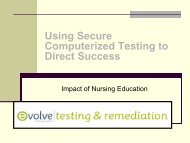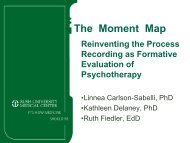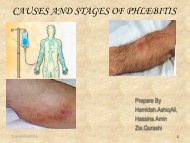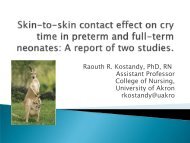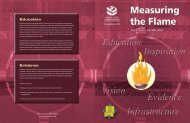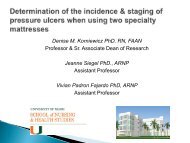Ulmer, Deborah - IUPUI
Ulmer, Deborah - IUPUI
Ulmer, Deborah - IUPUI
You also want an ePaper? Increase the reach of your titles
YUMPU automatically turns print PDFs into web optimized ePapers that Google loves.
Obstacles that made it difficult to<br />
decide to volunteer<br />
Issues that prevented nurses from<br />
being able to fully participate
• The aim of this transcendental phenomenological<br />
study was to explore how nurses experienced the<br />
decision to volunteer to provide humanitarian aid<br />
in the immediate aftermath of hurricane Katrina in<br />
fall, 2005.<br />
• Research questions:<br />
• What made you decide to volunteer?<br />
• How did you decide to go?<br />
• What was it like to be there?<br />
• What did you expect it to be like?<br />
• How was it when you came home?<br />
• How did the experience affect you?
• This method is about seeking meaning from<br />
appearances<br />
• It arrives at essences through intuition and reflection<br />
that lead to:<br />
• Ideas, concepts, judgments and understandings.<br />
• Committed to the rich descriptions of those<br />
experiences and refrains from analyzing and<br />
explaining.<br />
• The essences described emerge into one rich, universal<br />
description with elements common to all who<br />
experienced the phenomenon.
• Criteria for inclusion:<br />
• RN at the time. Volunteer. Assigned to hurricane<br />
devastation site. No compensation. Willing to<br />
participate.<br />
• IRB Approval<br />
• Snowball sampling used<br />
• Formal Written Consent<br />
• Recruitment script
• 11 identified.<br />
• All 11 participated<br />
• 9 provided aid in the immediate aftermath<br />
• 2 provided aid five months after the hurricane<br />
• All 11 nurses‟ stories are included.
• As nurses were identified, appointments were made by<br />
phone or email.<br />
• Interviews conducted at site selected by study<br />
participant.<br />
• Epoche written prior to each interview.<br />
• Participants were asked to tell their stories around the<br />
interview questions.<br />
• Interviews tape recorded and written.<br />
• Interviews transcribed verbatim by the researcher.<br />
• Transcription compared to tape for accuracy.<br />
• Saturation occurred with 9 th interview. All interviews<br />
were included.<br />
• Participants given pseudonyms.
• Member checking method used.<br />
• All 11 participants received the composite<br />
textural-structural story and were asked to<br />
verify that they heard their voice somewhere in<br />
the story.<br />
• All 11 responded stating they did hear their<br />
voices and see themselves in the composite.<br />
• NOTE: this is not a required step in the procedure
• Unavoidable wake up call to the inner soul.<br />
• Personal link to the area devastated<br />
• News stories and photos were deeply upsetting.<br />
“we were watching the news and the media, I was just<br />
sitting there completely appalled. I couldn‟t believe<br />
Americans were living in those conditions and<br />
weren‟t getting the help they needed.”<br />
• “Real faces, real people”<br />
• “I felt led spiritually to do something from the pictures<br />
and this is in our own country.”
• Subtheme 1: Thoughts:<br />
• “I think I thought that I needed to do something that was<br />
concrete and decisive.”<br />
• “I could feel something, but I wasn‟t sure what it meant.”<br />
• “I prayed about it and got my answers.”<br />
• Subtheme 2: Reflection:<br />
• “I think back through my life, different times I‟ve gone and<br />
worked and helped people out and how important it‟s been.”<br />
• “You know that „calling‟ they always talk about in nursing<br />
school and everybody goes, „Oh please?‟ Well, there you go, it<br />
does exist, it really does.”<br />
• “I guess it goes back to 9/11 where I didn‟t respond in any<br />
personal way. I wrote checks, but I didn‟t do anything<br />
personal.”
• Subtheme 1: Family<br />
• “Why do you want to go and do that? Why does it<br />
have to be you?”<br />
• “I made sure they had a clear understanding of how<br />
important this was to me and that it was something I<br />
was feeling led to do and they needed to be ok with<br />
that. I don‟t know that they were comfortable with<br />
that, but I needed them to be because I felt like I<br />
should go.”
• Subtheme 2: Work<br />
• “I thought when I said I really want to go down<br />
there and do this and it means I will miss three<br />
days of work it would be like, ok, we will work<br />
around it. Staffing wasn‟t great right then and<br />
there were a lot of people on orientation. They just<br />
said, „you need to cover yourself.‟ So I did. I<br />
needed three 12-hour shifts covered and I got all<br />
but 4 hours. Its two years later and I finally paid<br />
off my debt this Christmas. Although the hospital<br />
agreed it was a good thing to do, I wasn‟t<br />
supported.”
• Subtheme 3: Organizational obstacles.<br />
• State agencies: “We were ready to go but then<br />
we needed permissions and we were stymied.”<br />
• Nursing Education Programs:<br />
• Permissions at multiple levels<br />
• Coordination with other class faculty<br />
• College administration: “we had to jump through a<br />
bunch of hoops. It was an uphill battle. To this day I<br />
feel like my chair and dean hold it against me.”
• Subtheme 1: Conditions<br />
• “It was hot, in the 90‟s. We were working on a black<br />
tar pavement. Seeing a couple hundred patients a<br />
day. We were thirsty. We were hungry.”<br />
• “We stayed in a church and slept on a concrete slab<br />
and I really didn‟t think I was going to survive but I<br />
can tell you there was not a night that I didn‟t lay<br />
down that I didn‟t wake up the next morning and<br />
not even notice the concrete. That‟s how tired we<br />
were.”<br />
• “Some people became so physically exhausted. I<br />
mean they just couldn‟t think anymore and I got to<br />
that place as well. But you know, as a nurse, I just<br />
think you were prepared for that. You land on your<br />
feet.”
• Subtheme 2: Confusion:<br />
• “You could tell there wasn‟t a plan. People were<br />
showing up. Nurses driving in on their own to assist<br />
and then finding out they couldn‟t put a Band Aid<br />
on with a doctor‟s order.”<br />
• “So we thought we would get to Montgomery to<br />
this staging area and they‟d say, „Oh, we‟ve been<br />
waiting for you.‟ We got there and nobody knew<br />
anything.”<br />
• “So, communication and leadership was, there<br />
wasn‟t a clear chain of command. And so we said,<br />
„OK, we will function here within ourselves.‟ We<br />
kind of took direction from the doctor in the group.<br />
Everybody knew that model.”
• Subtheme 3: Relationships<br />
• “ Everyone bonded fast. We‟re all here because we<br />
want to be here because it‟s a disaster. We want to<br />
help and we are all here with the Red Cross and so<br />
quick bonding.”<br />
• The EMT‟s were hilarious and fun. The humor—this<br />
group of EMT‟s—always humorous, throwing out<br />
jokes, teasing. It was great.”<br />
• “there was a lot of bonding around what State you<br />
were from. It was the first time I had the experience<br />
of feeling like I am an American. We are here as<br />
Americans. I didn‟t matter what you believed, or<br />
what your religion was. We were just here to help<br />
and that was the guiding principle.”
• Subtheme 4: People in charge<br />
• “the people who ran our shelter were the most<br />
miserable people in the world and they were the<br />
most autocratic and dictatorial people in the world.<br />
They were nice to the people who were left<br />
homeless, they were horrible to the workers.”<br />
• “I saw people who were there as volunteers trying to<br />
understand their motivations for being there, there<br />
were also a lot of control freaks there including my<br />
nursing supervisor.”<br />
• “The staff was exhausted, irritable. Not in a good<br />
place. Tired of dealing with volunteers even though<br />
they were helping. It was challenging.”
• “We were giving tetanus shots. Our sharps box was a<br />
water bottle.”<br />
• “The best nursing care we provided was in touch, in<br />
listening, in just being there. People would say, „Well,<br />
what did you do as far as nursing?‟ Well, we basically<br />
sat and listened. And that‟s probably the most<br />
important thing you can do.”<br />
• “Our resources were skimpy; we had to be creative. It<br />
was never actually clear what we were supposed to do.<br />
There were no protocols. We made them up as we<br />
went.”
• “We came to realize the deepest needs were to<br />
be heard and seen as human beings, for<br />
someone to hear their story.”<br />
• “There was a lot of frustration for people like,<br />
why did we come if we couldn‟t practice. But I<br />
felt like we were allowed to touch people so I<br />
could work.”
• Subtheme 1: New ways of being.<br />
• “I am kind of surprised at myself now because I am<br />
doing Habitat for Humanity and I do soup kitchen<br />
when I can and for Christmas I asked my family to get<br />
an angel from the tree for part of my Christmas gift.<br />
And it‟s just like what? Who are you?‟<br />
• “We raised $6000 that one night. It was important for<br />
me to be part of that, to do something that would<br />
generate joy and to send it to those people. I knew I<br />
was changed forever.”<br />
• “When I went there I found my story. They‟ve asked<br />
me to go to Bosnia in May for health care education<br />
and for women‟s health. I am becoming a globe<br />
trotter…it all makes sense.”
• Subtheme 2: New educational quests<br />
• “the inspiration and driver to keep wanting to<br />
do my PhD stuff. I‟m not doing it because I‟m<br />
going to get a promotion. I‟m doing this for<br />
some real deep-seated internal reasons and so<br />
that I can somehow, I can somehow use it to<br />
make things better for people who really are in<br />
desperation.”
• Subtheme 3: New ways of thinking.<br />
• “The thing that really affected me was this whole<br />
concept of needs and wants. I‟m never going to use<br />
the word „need‟ again. I‟m never going to say I need<br />
again because how dare I say I need something<br />
unless I am as desperate as the people I saw in Africa<br />
and Mississippi. It‟s not an issue of need. It‟s so<br />
much more an issue of want.”<br />
• I vote a little different now. Or the considerations<br />
that I make when I vote are very different.”
• “ It‟s amazing because I hear people who have<br />
no clue, who haven‟t been to visit, who don‟t<br />
know what it‟s like and they say things like,<br />
„don‟t rebuild. Just plow over the whole area.‟<br />
When I hear those conversations they‟re<br />
depersonalized. And they‟re not really looking<br />
at the people who are affected.”
• Subtheme 4: New emotions<br />
• “It was huge in my life and I mean, we weren‟t<br />
even the victims. I knew I was changed forever.”<br />
• “It was amazing. Just amazing. You know, what I<br />
thought I would do was nowhere near the<br />
enormous difference we made. It was incredible.”<br />
• “I was so proud of myself. I don‟t think anything<br />
could dampen the proudness that I have. It was an<br />
experience I will never forget.<br />
• “I think it was, besides my son, the most profound<br />
thing I had ever seen, the most amazing thing I‟ve<br />
ever done.”
• Subtheme 5: New Ways of understanding nursing.<br />
• “we talk about the Sacred Covenant” at my<br />
university, between the nurse and the patient. It<br />
was a clear example of how important that is. And<br />
as far as what‟s nursing‟s role? I guess my<br />
philosophy is nursing‟s role is first, be the<br />
presence. Nursing‟s role is to be a presence and<br />
then explore what their needs are and go from<br />
there.”<br />
• “I think between nursing and that experience it<br />
gave me a deeper understanding of the need for<br />
community service and what we need to do for<br />
people.”
• Helps us to understand more about nurses and their<br />
determination in the volunteer role.<br />
• Stories support the literature presented about compassion<br />
and volunteerism.<br />
• Nurses will continue to volunteer in these kinds of events.<br />
• There is work to be done to prepare for those who volunteer<br />
so that their skills can be utilized.<br />
• Nurses can be helped to understand that nursing is more<br />
than scope of practice.<br />
• Nurses who do this are almost always changed as a result of<br />
the experience.<br />
• The relationship between the nurse and the patient,<br />
whomever the patient is and whatever the work of the nurse<br />
is, is significant.<br />
• For these nurses, their response was a calling.
Moustakas, C. (1994). Phenomenological research<br />
methods. Thousand Oaks, CA: Sage.


